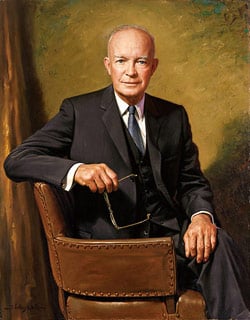Dwight Eisenhower more popularly called as Dwight David “Ike” Eisenhower born on October 14, 1890 was an American General and famous politician, who served as the thirty-fourth President of the United States from 1953 to 1961.
During the Second World War, he was the Supreme Commander of the Allied forces in Europe. the liability of planning and monitoring the successful encroachment of France and Germany in 1944-45 was also under Dwight Eisenhower. He became the first supreme commander of NATO in 1951. Being a Republican he was elected as the 34th U.S. President. During his rule, he concluded the Korean War, and holds a stern supervision on the Soviet Union during the Cold War. He also made nuclear weapons improved defense ammunition, Space Race was launched; Social Security program was expanded, and thus began the interstate Highway System.
Eisenhower‘s most encouraging achievement during his era was authorizing the bill of Interstate Highway System in 1956. He justified the project claiming it to be compulsory for the American security during the Cold War. The large cities could have been targets in the possible future war, and the highways were designed for precaution and allow the military to move in.
In January 1957 Dwight Eisenhower preached the “Eisenhower Doctrine” that encouraged to improve the armed forces against any aggression that arrives from any country commanded by international communism.
In addition, Eisenhower supported the French colonial forces in Vietnam who were fighting an independence war there. Dwight Eisenhower expired on March 28, 1969 and left behind much of his ideas and constructive plans to come in to being.
Facts |
|
|---|---|
| Full Name: | Dwight David Eisenhower |
| Date of Birth: | October 14, 1890, Denison, Texas |
| Died on: | March 28, 1969, Washington, D.C. |
| Burial site: | Place of Meditation, on the grounds of the Eisenhower Presidential Center, Abilene, Kansas |
| Parents: | David Jacob and Ida Elizabeth Stover Eisenhower |
| Spouse: | Marie “Mamie” Geneva Doud (1896-1979; m. 1916) |
| Children: | Doud Dwight (1917-1921); John Sheldon Doud (1923-) |
| Religion: | Presbyterian |
| Education: | U.S. Military Academy at West Point (B.S., 1915); graduate of several military colleges |
| Profession(s): | Soldier; general; Columbia University president |
| Government ranks: | None |
| Political Party: | Republican |
| President Term: | January 20, 1953-January 20, 1957 (first term); January 20, 1957-January 20, 1961 (second term) |
| Age when assumed office: | 62 |
Outcome of the Elections |
|||
|---|---|---|---|
| 1952 | Presidential / Vice Presidential Candidates | Popular votes | Electoral votes |
| Dwight D. Eisenhower / Richard M. Nixon (Republican) | 33778964 | 442 | |
| Adlai E. Stevenson / John J. Sparkman (Democratic) | 27314992 | 89 | |
| 1956 | Presidential / Vice Presidential Candidates | Popular votes | Electoral votes |
| Dwight D. Eisenhower / Richard M. Nixon (Republican) | 35581003 | 457 | |
| Adlai E. Stevenson / C. Estes Kefauver (Democratic) | 25738765 | 73 | |
Snapshot of Dwight Eisenhower’s life |
|
|---|---|
| 1890 | Born in Texas |
| 1915 | Graduates from West Point |
| 1917 | Supervises training of the Tank Corps at Fort Meade, Maryland, during World War I |
| 1925 | Attends the U.S. Army’s Command and General Staff School, graduating first in his class |
| 1930s | Serves as chief military aide to General Douglas MacArthur |
| 1939-45 | World War II |
| 1943-45 | Serves as supreme commander of Allied forces during the latter half of World War II |
| 1944 | Plans the successful invasions of German strongholds in North Africa and Italy; directs the D-Day invasion of France |
| 1945 | Commands the Battle of the Bulge, effectively ending Nazi aggression in Western Europe |
| 1948-50 | Serves as president of Columbia University |
| 1950-52 | Serves as commander of the NATO Forces in Europe |
| 1953-61 | Serves as thirty-fifth U.S. President |
| 1954 | Supreme Court calls for an end to racial segregation in Schools in the Brown v. Board of Education of Topeka case, and Eisenhower orders regular army units to escort African-American students to class at Central High School in Little Rock, Arkansas |
| 1955 | Suffers a serious heart attack; recovers fully and is reelected in 1956 |
| 1969 | Dies in Washington, D.C. |
Presidential Term and its details |
|
|---|---|
| Dates: | January 20, 1953-January 20, 1957 (first term) |
| January 20, 1957-January 20, 1961 (second term) | |
| Vice President: | Richard M. Nixon (1953-61) |
Contemporary Secretaries |
|
|---|---|
| Secretary of Labor | Martin P. Durkin (1953) |
| James P. Mitchell (1953-61) | |
| Secretary of Commerce | C. Sinclair Weeks (1953-58) |
| Frederick H. Mueller (1959-61) | |
| Secretary of Defense | Charles E. Wilson (1953-57) |
| Neil H. McElory (1957-59) | |
| Thomas S. Gates Jr. (1959-61) | |
| Secretary of Health, Education, and Welfare | Oveta Culp Hobby (1953-55) |
| Marion B. Folsom (1955-58) | |
| Arthur S. Flemming (1958-61) | |
